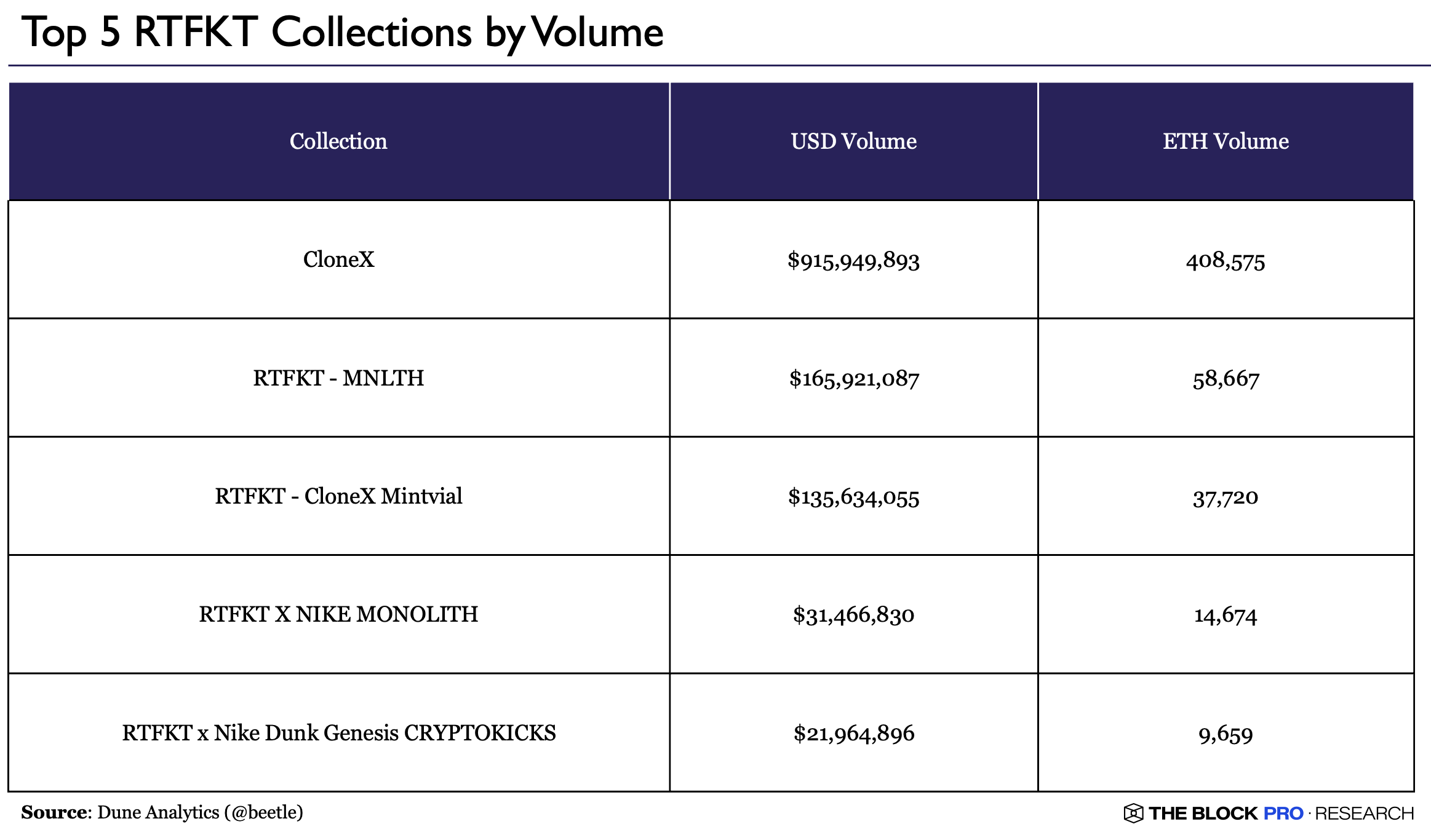Nike-RTFKT's crypto universe nears $1.4 billion in NFT trading as sneakerheads swoon

Quick Take
- Nike-RTFKT non-fungible token collections have generated nearly $1.4 billion in trading volume and $170 million in earnings.
- An event last month where NFT holders could order limited-edition Nike-RTFKT shoes caused trading for the NFTs to leap by more than 600%.

While the portmanteau phygitals may eventually (hopefully) fade from existence, never to be spoken again, as a concept they look like they're here to stay.
The primary example of that may be Nike and RTFKT's non-fungible token universe which has, in less than two years, while facing a bear market much of the time, generated more than one billion dollars in trading volume and more than one hundred million dollars in earnings.
Since December 2021, Nike-RTFKT NFTs have spurred close to $1.4 billion in trading volume, according to The Block Research data. At the same time, RTFKT's more than two dozen total collections, including the CloneX-Takashi Murakami avatar NFT drop of late 2021, have earned $170 million, according to DefiLlama.
While the majority of those numbers are thanks to the success of the CloneX collection, which launched during the height of crypto's bull run, the volume and earnings of the other collections is still noteworthy. In some cases owning the NFTs has unlocked the opportunity for consumers to order limited-edition Nike's that come with a special authenticating tag embedded in the shoes.
Thousands of sneakerheads, and even NBA great LeBron James, have jumped on the opportunity.

The Block Pro Research
Sneaker collector, NFT enthusiast
"The quality is really, really, really good. I'd say better than any of the other Nike shoes that I have," said photographer Frankie Sutera, a long-time sneaker collector and NFT enthusiast living in Utah. Sutera has ordered a total of nine pairs of Nike-RTFKT shoes after acquiring the necessary NFTs.
During the last "forging," he ordered eight pairs of special-edition RTFTK Air Force 1s and then most recently one pair of the Dunk Genesis Cryptokicks, available for order last month. The "forgings" are special limited windows where owners of Nike-RTFKT tokens can order physical pairs of the shoes, picking the size and design they want.
The recent forging of the Dunk Genesis Cryptokicks, which ran from Oct. 18 to 30, caused trading for the required NFTs to jump to $613,000 during the month, according to CryptoSlam! data. In September, trading for the tokens registered a tepid $85,000, meaning the October spike constituted a gain of more than 600% month-on-month.
"The excitement we continue to see for Nike Cryptokicks on OpenSea … demonstrates how this technology empowers fans with inherent ownership," said Kelly DiGregorio, vice president of content partnerships at major NFT marketplace OpenSea.

NBA great LeBron James seen wearing Nike-RTFKT shoes. Image: RTFKT.
Co-founder of the popular Pudgy Penguins NFT collection, Cole Villemain posted a video to X during the Dunks forging event to express his enthusiasm for RTFKT's work. In the video, he both unboxes a pair of Air Force 1s for his more than 125,000 followers while also telling them how "tons of people commented on" a pair of Nike-RTFKT sneakers he wore to a Beeple event.
"The Dunk forging just happened … super excited about that … I forged 27 pairs, all three colorways," Villemain said in the video.
During the Dunk forging, while a pair cost about $220 for people who owned the NFTs, some people were trying to sell the shoes on secondary markets like eBay for as much as $1,000. People who ordered Dunks during last month's forging will likely have to wait until at least June 2024 before receiving them, according to RTFKT.
Gamechanger: Nike buys RTFKT
Nike acquiring RTFKT in 2021 may have turbocharged the NFTs-tied-to-limited-edition sneakers business model, but the web3 startup had sold tokens and shipped sneakers before the shoe giant came along. In early 2021, RTFKT sold $3.1 million in NFTs in seven minutes, according to one of its co-founders. Owners of the NFTs could then redeem for a pair of actual shoes. The RTFKT shoes, made in conjunction with artist FEWOCiOUS, considered collectibles by many, now sell for thousands of dollars online.
Other major shoe and apparel companies like Adidas and Puma have also both shown interest in the tokenization of real world assets as means of ensuring authentication or ways to tempt consumer with exclusive content. But it's not only shoe companies. Real-world asset tokenizations span a wide range of products including sports cars and psychedelic mushrooms.
One major benefit of merging of digital and physical using blockchain is authentication, which is often achieved by using a smartphone to access a chip or tag attached or embedded in physical items, helping to make it a phygital.
The NFC tag which authenticates the Nike-RTFKT Air Force 1s is Sutera’s favorite part of the shoes. The tag, which is linked to a corresponding NFT using a smartphone, helps prove both the product’s authenticity and ownership.
"In the sneaker world that is a huge thing. The replica market is gigantic. More people are creating fake shoes every day. How do you not get scammed by buying a pair of fake shoes? This is a super easy way to avoid it," said Sutera. "If nothing else comes from NFTs I think that's a fantastic use case."

Nike-RTFKT Air Force 1s. Image: Frankie Sutera.
© 2023 The Block. All Rights Reserved. This article is provided for informational purposes only. It is not offered or intended to be used as legal, tax, investment, financial, or other advice.



